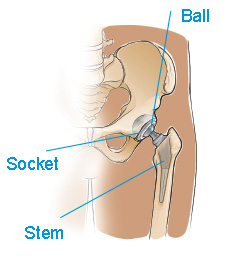Before Surgery
If you and your surgeon decide that total hip replacement is right for you, a date will be scheduled for your surgery. Several things may be necessary to prepare for surgery. For example, your surgeon might ask you to have a physical examination by your primary care physician.
You should also finish any dental work that may be under way to prevent germs in your mouth from entering the bloodstream and infecting the new joint. If you prefer, or if your surgeon feels it is needed, you may want to donate your own blood ahead of time to reduce the risk of your body reacting to the blood transfusion.
During Surgery
On the day of surgery, an intravenous tube will be inserted into your arm to administer necessary medications and fluids during surgery. You will then be taken to the operating room and given anesthesia.
Total Hip ReplacementThe surgery usually takes 2 to 4 hours, although this is dependent upon the severity of the arthritis in your hip. In the operating room, a urinary catheter will be inserted and left in place for 1 or 2 days. Compression stockings and pneumatic sleeves will be put on both legs.
The procedure is performed through an incision in the area of the hip. The ball-end of the thighbone (femur) is cut and replaced with the new ball and stem components. The stem may be stabilized with or without cement. The damaged surface of the socket is smoothed in preparation for the insertion of the new socket. The ball and socket are then joined. When the surgeon is satisfied with the fit and function, the incision will be closed and covered with dressings. You will also find small drainage tubes coming out of the hip to drain fluid from the wound.
Recovery
You will be sent to the recovery room, and as the anesthesia wears off you will slowly regain consciousness. A nurse will be with you, and may encourage you to cough or breathe deeply to help clear your lungs. You will also be given pain medication and will find a foam wedge or pillows placed between your legs to help hold your joint in place. When you are fully conscious, you will be taken back to your hospital room.
What Can I Expect After Surgery?
When you are back in your hospital room, you will begin a gentle rehabilitation program to help strengthen the muscles around your new hip and regain your range of motion. On the day of surgery you may be asked to sit on the edge of the bed and dangle your feet. You will also learn how to protect your new hip while doing daily activities.
As soon as possible, usually within the next 24 hours, your physical therapist will help you start walking a few steps at a time. As you heal you will progress from walker or crutches to a cane. Before you are dismissed from the hospital, an occupational therapist will also show you how to perform daily tasks at home with your new hip. For example, he or she will instruct you on how to go to the bathroom, how to dress yourself, how to sit or stand, how to pick up objects, and many other tasks.
After about 2 to 4 days, or when your surgeon determines that you have recovered sufficiently, you will be discharged. You may be transferred to a nursing facility for a few more days, as determined by your surgeon. Upon returning to your home, you will need to continue taking your regular medications and continue exercising as directed by your surgeon or physical therapist. Walking, remaining active, and practicing the required exercises are the quickest ways to full recovery. Within 6 weeks, you will revisit your surgeon at the hospital to check up on the progress of your recovery.
In most cases, successful total hip replacement will relieve your pain and stiffness, and allow you to resume many of your normal daily activities. But even after you have fully recovered from your surgery, you will still have some restrictions. Normal daily activities do not include contact sports or activities that put excessive strain on your hips. Although your artificial hip can be replaced, a second replacement may not be as effective, and your activities would likely be even more restricted. Talk with your surgeon about your specific situation.

